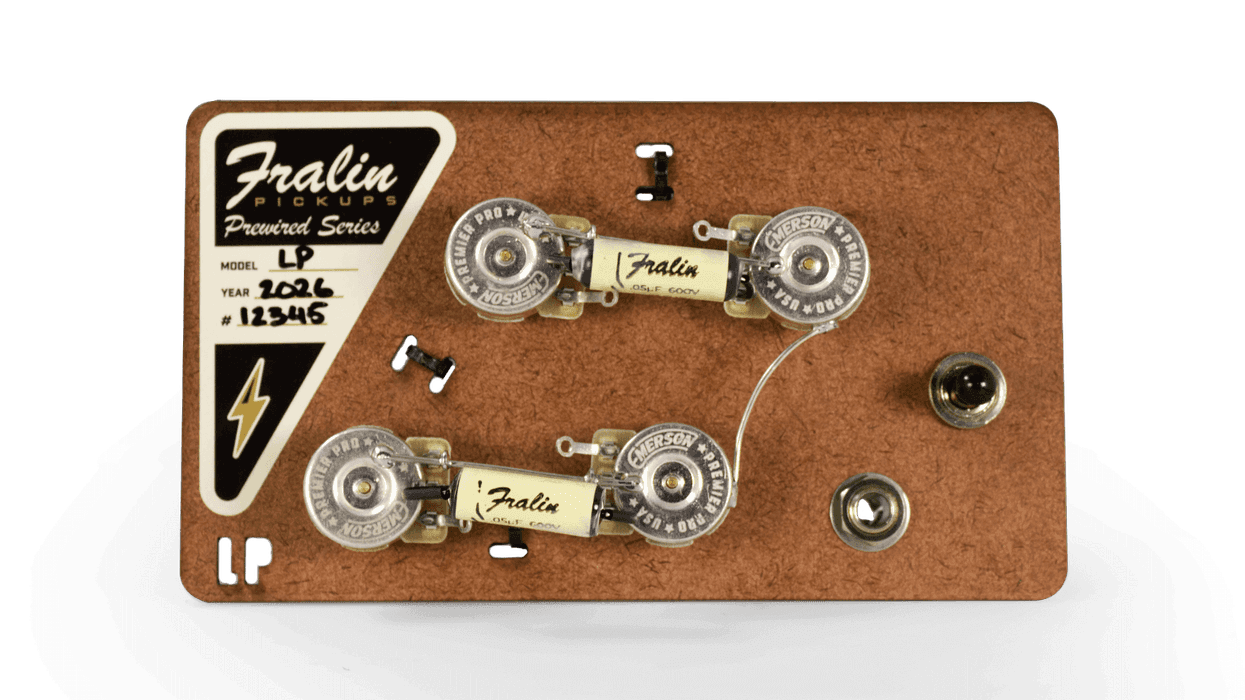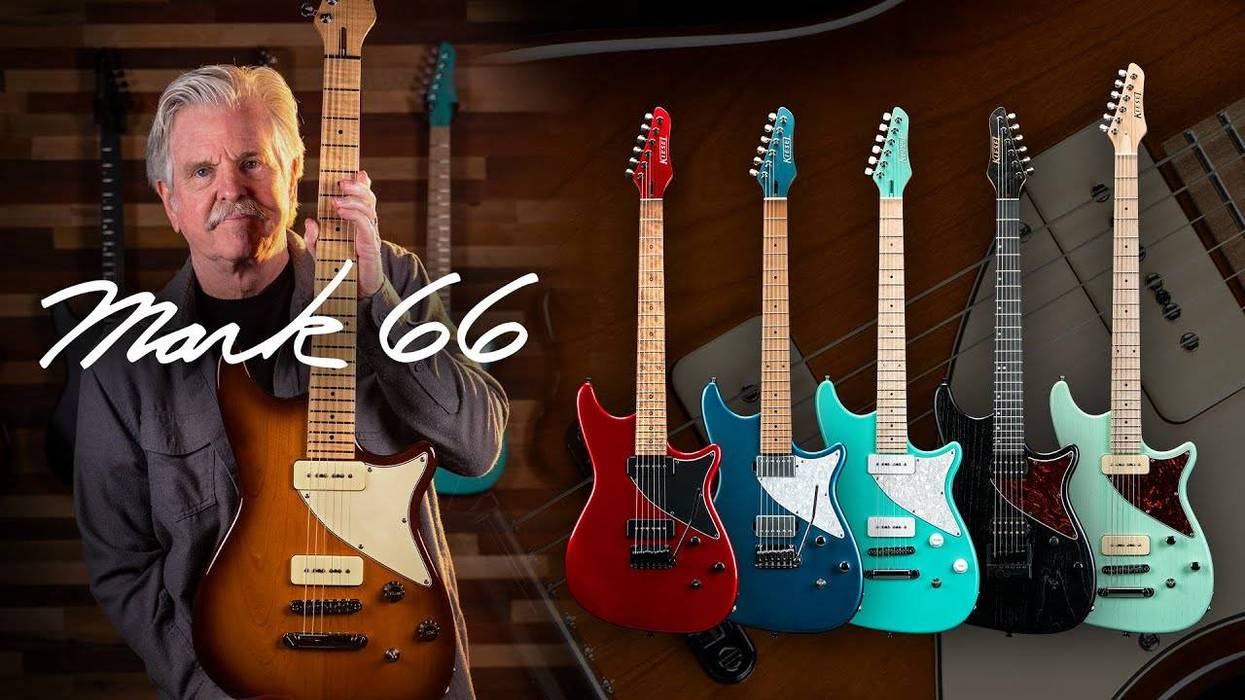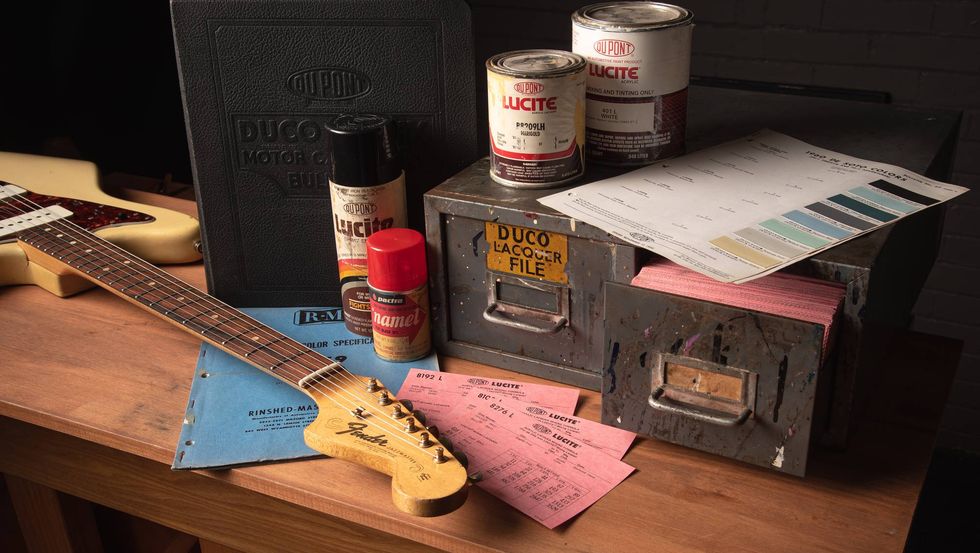It’s pretty obvious that guitarists are concerned mostly with guitars, amps and overall tone—and that’s PG’s central focus, too—but sometimes we can neglect the small but basic precautionary steps that would protect our most prized possessions. So, we decided to pay some attention to the often-overlooked accessories that can potentially save guitars from crashing to the floor at the next practice or gig: strap locks and locking straps.
To test these various devices, we used a pair of standard guitars everyone can relate to: an all-mahogany 2008 Gibson Les Paul Studio and a 1980s Japanese Fender Stratocaster. Before assembling all of the locking mechanisms, first we checked the packages to see what was included in each. Then, we compared strap buttons and screws to the standard Gibson and Fender equipment. After assembling each mechanism, we maneuvered the guitars through rigorous stage-ready jolts, jumps and twists to assess the quality of each product. We lifted the guitars by their straps, shook them, yanked on them, and even tried a few strap-spins (we’re a little rusty). It was a lot like being 12 again, bouncing off the walls like there would be no price to pay, but this time we’re calling it research. Basically, we did all the things we could think of to make a proud guitar owner wince. Then, when we came to our senses, we checked to see how each fixed assembly would fit with the guitars in their cases.
STRAP LOCK SYSTEMS 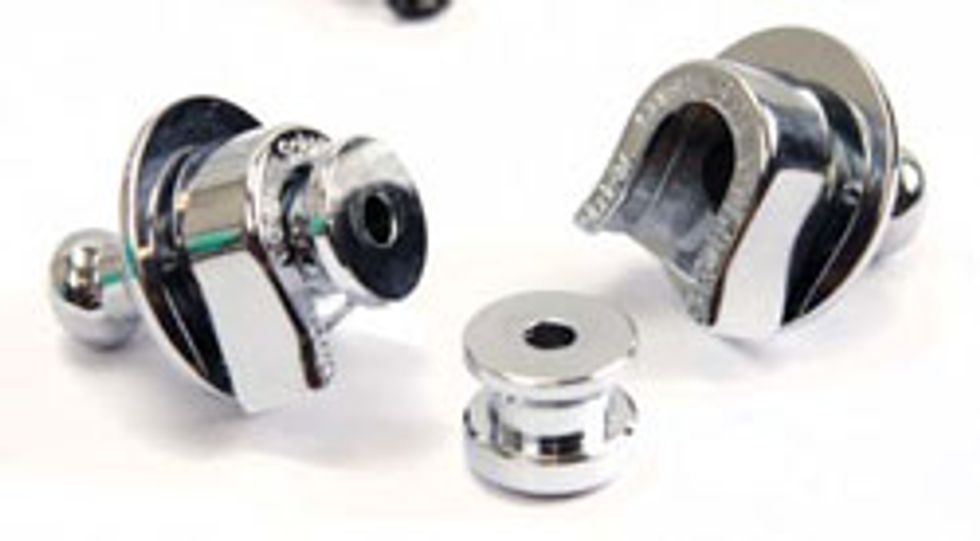
The pioneer in the strap locks, Schaller has been producing Security Locks for 30 years, and they’re featured on select Fender Custom Shop models. The Schaller Security Locks are the smallest in this roundup, but their size doesn’t diminish their ability to stand up to the competition. Actually, the lack of mass may be a benefit compared to other, clunkier locks. The screws in the package were smaller than standard Gibson screws, which could present a problem. Also, if the lock assembly isn’t fastened 100% snug on the strap, or your strap is very worn, it could easily slide through a large or loose eyehole. To ease your worries, all Schaller products are guaranteed for five years.
Like many of the others, the use of ball bearings and springs means you could experience problems down the road if you don’t keep them properly lubricated. Once everything is assembled, secured and lubed, though, the standard chrome Schaller locks are easy to fasten and unfasten. They’re sturdy and dependable, and they’ll last through all of your slinging and swinging. They’ll also fit easily within the Gibson case and won’t damage your guitar during storage. Schaller sells pins separately, so you can deck out all your guitars and just use your favorite strap for all your guitar changes. They’re available in chrome, gold, satin and ruthenium.
List $14.99–19.99
schaller-electronic.com 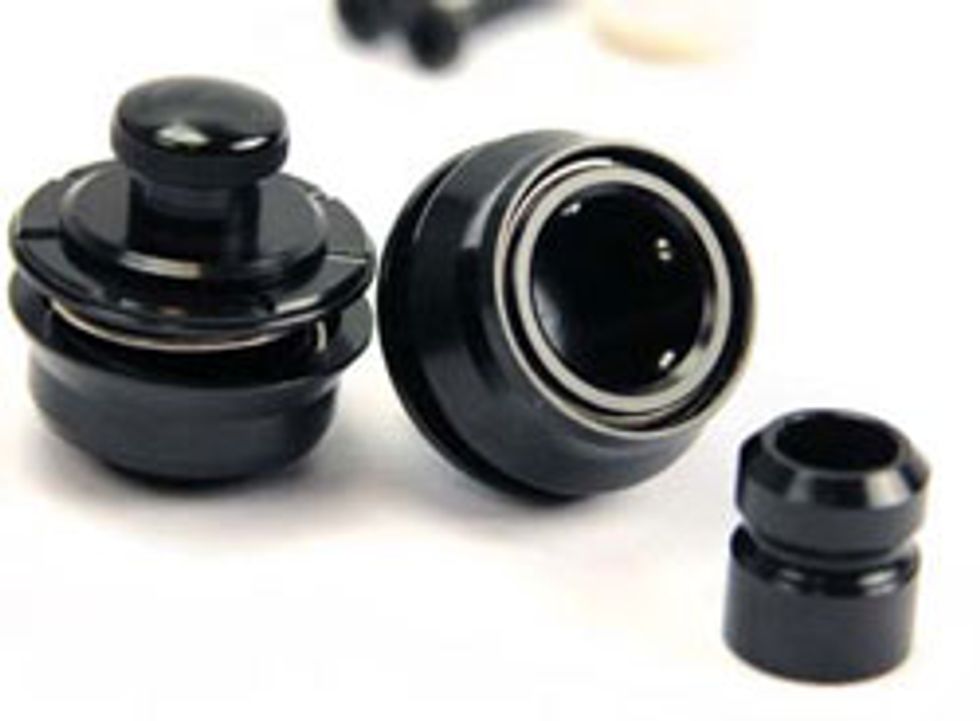
Made of anodized aluminum, the Metallics were the easiest in the group to assemble. All they required was inserting the mounting screw (identical to the Gibson’s) and tightening the strap pin, then screwing a fastener to the inside of the strap holes. The lock itself contains a spring and ball bearings, which indicate the lock’s security with a convincing “pop.” The locks disengage with a simple push-button, but remain locked with any additional pressure or weight on the assembly, which is ideal for those accidental bump-and-runs with other gear and bandmates.
After passing all the simulated stage encounters trials, the locks were still intact and begging for more. With strap pins similar in size to standard Gibsons, the Hennessey locks had no problem fitting in the snug case. One thing that really stood out in this package: a felt washer included to protect the guitar against the metal pins—we’re sure that taking such care is greatly appreciated by guitars everywhere. Pairs come in silver, purple, red, gunmetal, blue and black.
List $29–41
hennesseyguitarparts.com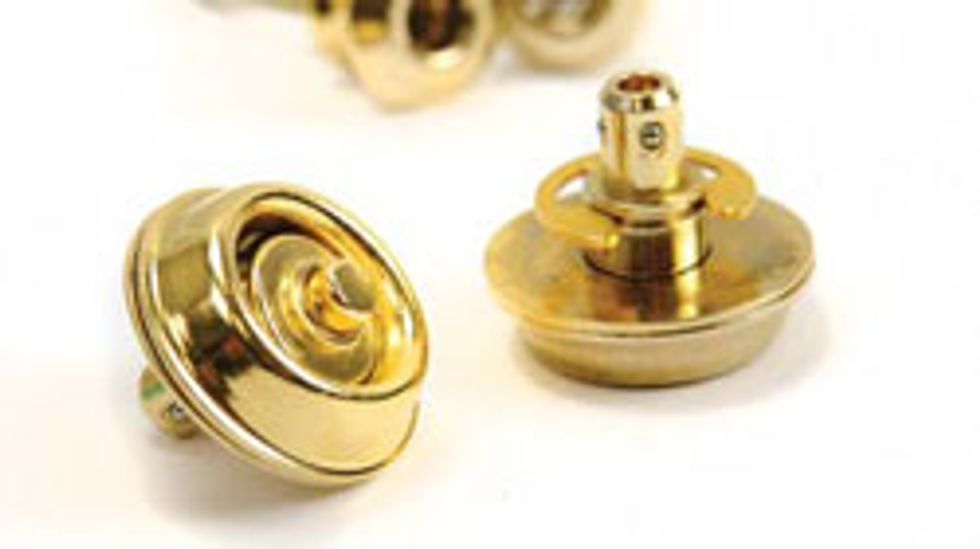
Dunlop has been producing these since 1988, and they’re OEM products on several brands of guitars and basses. They’re probably the most noticeable strap retainer devices in our roundup. One area these aim to address is the pin connector that attaches to the strap. To counter a tendency for strap lock connectors to fall through the eyehole of a worn or distressed strap, Dunlop designed a fatter, more obtuse pin connector to keep the strap where it’s supposed to be, on your guitar.
They’re release-tested up to 800 lbs, so we did our best to make them fail. The locks didn’t flinch. The 360° groove-and-ball design allows the unit to rotate without catching, and the case-hardened steel skin guarantees long life. We did notice that the push-button is difficult to disengage when the lock and bearings haven’t been lubricated, which can be inconvenient. Again, this is either a blessing or a hassle, depending on how often you’re making guitar changes with one strap. The Straploks come in black, chrome and gold finishes.
List $20–30
jimdunlop.com 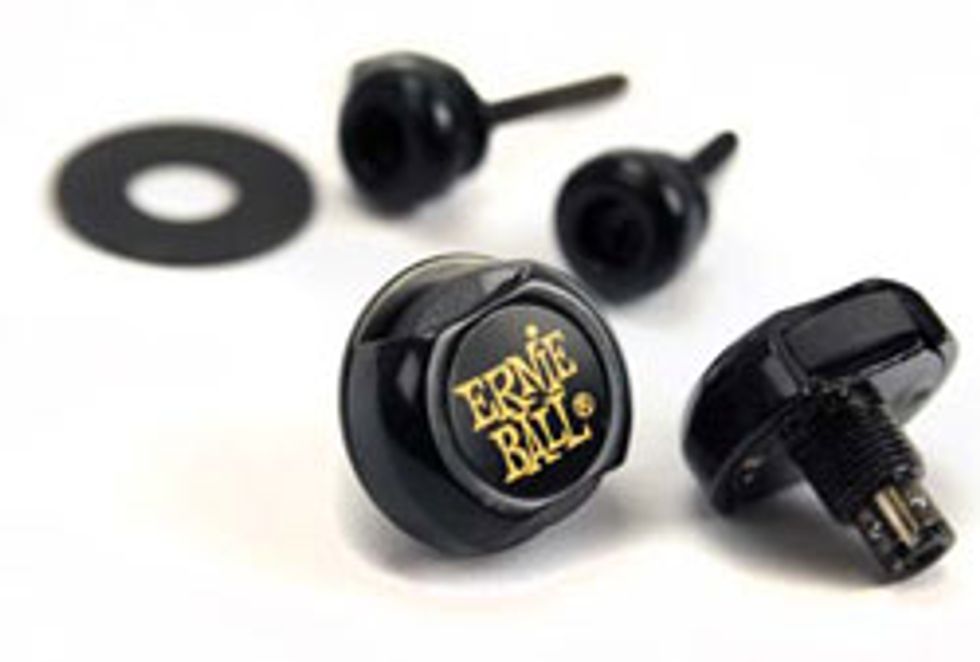
These are tested for over 850 lbs of pressure, which should offer sufficient safety even for owners of old-school LPs. Ernie Ball worked with a company called Robust Mechanics on the mechanical engineering, and the Super Locks debuted at ’08 Winter NAMM. The necessary assembly was straightforward, and the screws and strap buttons matched the standard Gibson parts, making it an easy swap-out. This package does not offer a protective washer to safeguard guitar finishes.
After assembly, we put the locks through their paces, and they handled everything we threw at them. We even tried some “accidental” bumps to disengage the locks, but they didn’t go for it—the pinch-and-release mechanism ensures greater protection, as it has two points of release rather than one (push down and pull). Like the others, these need to be kept lubricated. Super Locks come in black, chrome or gold.
List $26–35
ernieball.com 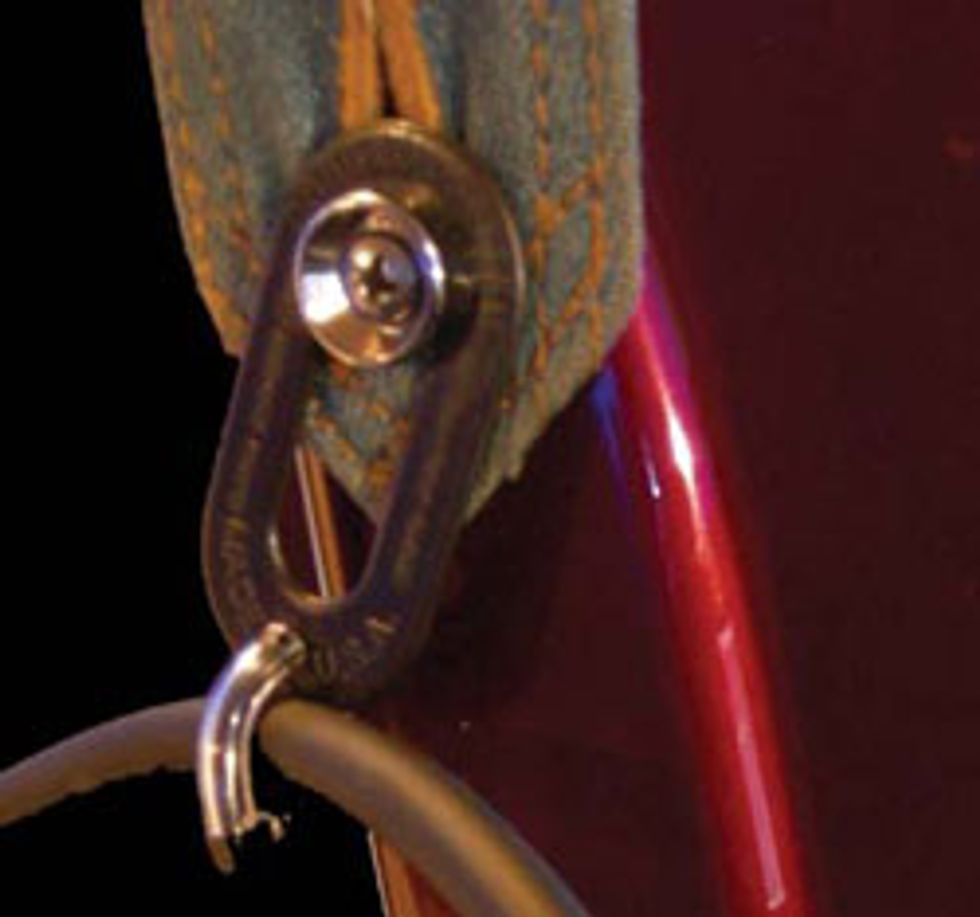
Designed and patented by Bill Gray and Allen Chance, the latter also helped develop the patents for what became Dunlop Straploks, the Cord Lok System secures cords and acts as a strap lock on the rear button. The assembly of the Cord Lok is minimal, and requires no modification to a guitar with Fender strap buttons. A standard Strat button is included, in case you need one.
The Cord Lok fits snug on this style of buttons only. It feeds the cord through a tight loop to relieve tension and prevent it from unplugging. All the materials are made of soft, durable plastic to ensure it won’t mar the guitar’s finish. It also works well in conjunction with Schaller and Dunlop strap locks. It even provides an elastic loop to wrap a cord after use. Although it’s meant for the rear strap button, it will work on the front button, too, if you’re in a pinch—and it comes in packs of two.
List $15
f1pick.com
LOCKING STRAPS 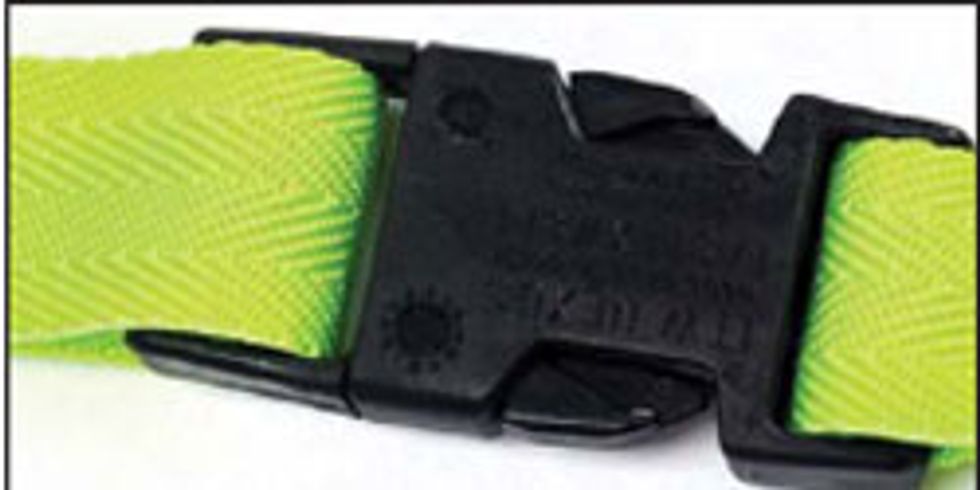
Designing these back in the early ‘80s, Larry DiMarzio set out to accommodate any and all players with a versatile line-up of secure straps. Now his line of USA-made ClipLocks boasts a collection of straps in varying sizes made from nylon, cordura, cotton, and Italian leather. There are also signature straps (a leather Steve Vai and a leopard-print Yngwie J. Malmsteen). Whether you’re a jazz guitarist who keeps the guitar snug against your chest or a metal-maniac who lets that baby hang, these straps have the length to cover the need.
As for the mechanics, DiMarzio keeps things fundamentally simple with few parts and easy assembly. There were only two minor concerns. First, the female ends of the clips stay mounted to the guitar, and may rub against the instrument in the case, potentially leading to some harm for the finish or wood, but the use of plastic doesn’t seem too threatening to the wood for standard storage. Second was the fact that material connecting the clip to the guitar is made to match each particular strap. The clips do work with other ClipLock straps seamlessly, but the aesthetic appeal is lost when they’re mis-matched with straps of different colors or materials. With thoughtful add-ons (rubber washers and two sizes of mounting screws—one set identical to the Gibson’s) to protect the guitar’s finish, the ClipLock works well. According to DiMarzio, they’ll hold over 150 lbs. Even our guitar-slinging antics couldn’t jar these loose. List $26–89 dimarzio.com 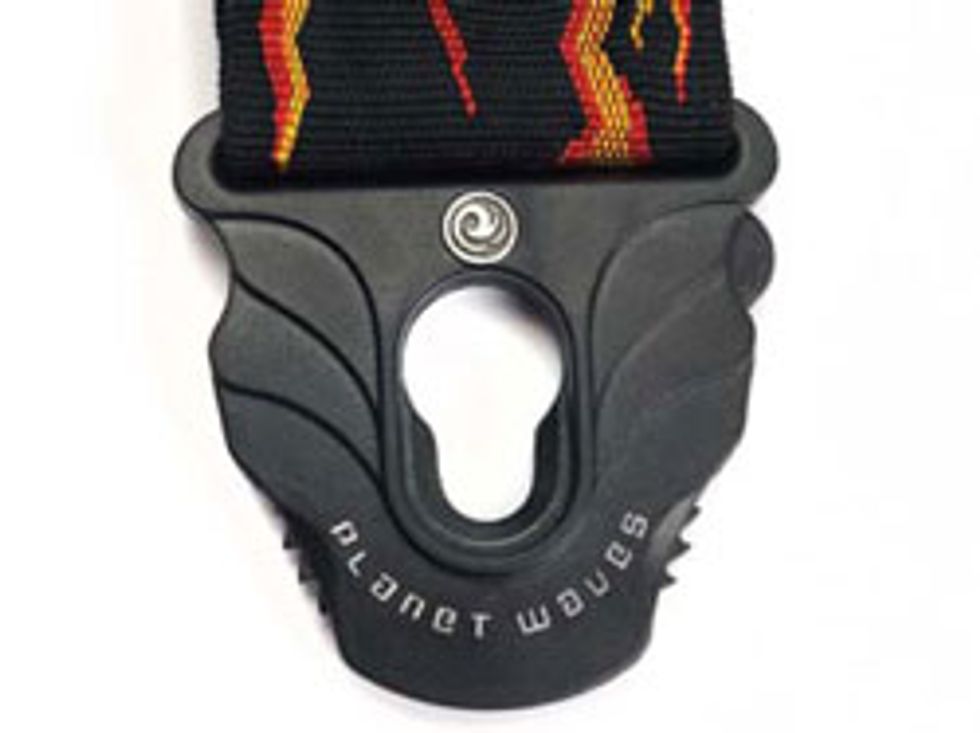
The Planet Lock Straps are an ideal alternative if you want the security of a strap lock but don’t want to alter the guitar. With a few clicks of the locking mechanism, the strap locks onto the existing guitar pins. It’s released just as quickly by pinching the safety button and rolling back the lock. We tried locking it to a number standard pins, and each time it locked snug and held the guitar without failing during our acrobatics.
These are not your average 2” nylon straps either. They’re a bit thicker and made to stay flat (they don’t roll in at the edges). They’re comfortable and distribute weight over the shoulders rather than pulling on your neck. You do have to remove the strap to adjust the length, which could be a benefit or a hassle, depending on how often you alter your straps. In addition to the fact that there’s no assembly on the guitar, both locking ends are padded with rubber molding so the locks won’t harm to the finish. There’s also a discrete pick pocket to hold an extra if you lose yours. The straps come in various woven patterns, including stars and stripes, flames, black, iron cross, voodoo and many more.
List $32.99
planetwaves.com 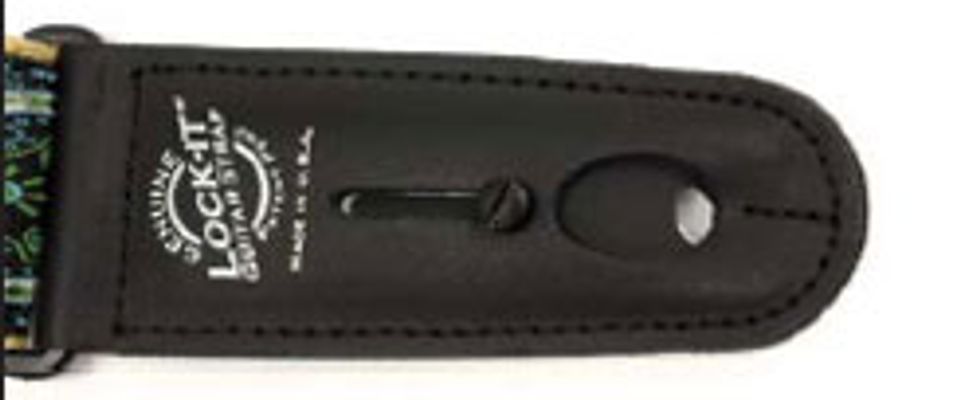
We have to admit that some things are not what they at first appear to be. This time, it’s a good thing. We were initially hesitant about the Lock- It Guitar Straps. To be honest, they don’t look like they’ll do the trick: the locking mechanism is thin and flexible, not at all like the bulky, solid components we were getting used to. But after looking into the science of their construction and effective but simple design—and testing them out—we did an about face.
The all-in-one package requires no modifications to a guitar and features spring-loaded locks using Slide-Lock Technology. The sliding locks residing within the leather strap ends are slim and highly flexible, but they won’t let go. They may look like they will, but they won’t (we tried). They also come with reversed front ends for guitars with pins at the neck/heel joint. They were a snap to put on and remove from all the guitars we tried them on, and they had no problems adjusting to the varying pin sizes. These come in a wide variety of patterns and materials, including polypropylene, leather and hemp. After nearly turning our noses up at these straps, we find ourselves singing a different tune about the easy locking solution they offer.
List $24.95–62.50
lockitstraps.com
Lock, Stock and Roll: Strap Lock Roundup
To help keep that prized guitar safe from drops and accidents, we review a number of strap locks and locking straps.
By Chris KiesJul 22, 2009
Chris Kies
Chris Kies has degrees in Journalism and History from the University of Iowa and has been with PG dating back to his days as an intern in 2007. He's now the multimedia manager maintaining the website and social media accounts, coordinating Rig Rundown shoots (also hosting and/or filming them) and occasionally writing an artist feature. Other than that, he enjoys non-guitar-related hobbies.








